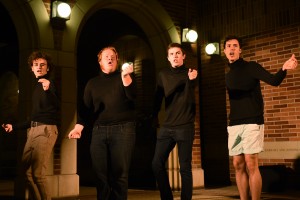Room A32 of the Humanities Building is filled with busy Bruins scribbling lecture notes during the day.
By night, the chairs and tables are moved to the classroom’s outer edges and a keyboardist installs herself near the professor’s wooden lectern. In the center of the room, student actors rehearse in front of a whiteboard backdrop.
For Act III Theatre Ensemble’s production of “Love’s Labour’s Lost,” director Abigail Faber, a fourth-year theater student, said the line between classroom and stage is virtually nonexistent.
The group will be performing an updated, musical version of Shakespeare’s original play about a group of former students who attend their college’s five-year class reunion party. The show will premier Nov. 20 on UCLA’s Fowler Museum Terrace. Faber said the outdoor setting keeps the audience engaged in the moment.
“We want the audience to feel like they too are at the college reunion party, like it’s a big communal fun time,” Faber said.
She said the show is about college life, past relationships and growing up. In the play, characters reminisce about their college days, begin romantic relationships and suffer tragedy. The play may have been written nearly 400 years ago, but Shelby Barry, a second-year theater student, said its themes of love, pain and loss are still prevalent today.
In addition to a modernized plot, Barry said the musical blends Shakespeare’s poetic prose with a dose of 21st-century terminology, with references to Papa John’s, Big Gulps and The North Face. Charles Platt, a second-year theater student, said Act III’s adaptation incorporates a rendition of a recent chart-topping hit, which will remain a show secret until opening night.
Beyond the pop culture references, Faber said Act III seeks to connect the lives of Shakespeare’s characters from the mid-1590s to the lives of UCLA college students today.

“Shakespeare is really intimidating for performers, directors and audiences alike, but this show is fun because it lets us explore Shakespeare from the perspective of a college student,” Faber said.
She also said the group chose “Love’s Labour’s Lost” because it resonated with each of the actors on a personal level.
First-year theater student Sara Silva said she relates to her character Jaquenetta, the town’s waitress and a hopeless romantic.
“I used to work as a waitress in a coffee shop, and I feel like I can draw from this experience and my previous relationships to create something believable,” Silva said.
The play’s contemporary wardrobe also helps the actors get into character. Charles Platt, a second-year theater student, said that clothing choices range from party dresses and suit jackets, to flannels and baseball caps, with each contributing to the unique personalities of each character. For instance, Platt said he wears pink thigh high boots and a gray suit jacket to contrast his character’s fun loving with his serious side.
Platt plays the character Boyet, for whom he said portrayal comes naturally.
“Boyet genuinely cares for the girls that he is friends with and serves. I too, as a friend, strive to do the same, so finding that connection was very helpful for me,” he said.
In addition, Platt said the social encounters that occur in the text, such as characters dancing at parties and forming relationships, are weekly realities for the majority of college students.
Will Block, a third-year theater student and the actor who plays Dumaine, a comedic intellectual, said the production serves as a reflection of college youth, but also, a sad truth. Block said the characters live in a haze of silliness; however, when a sudden death occurs, they realize that it’s time to grow up and become responsible adults. Block believes that this coming-of-age theme is especially applicable to college students, as they continue their journey to adulthood.
Through analyzing “Love’s Labour’s Lost,” Faber discovered that what she, the cast and UCLA students experience everyday are the same things that individuals experienced centuries ago.
“Part of me thinks, ‘Oh, I’m directing Shakespeare and it’s so prestigious,’ but part of me thinks, ‘You know what? I live this life,'” Faber said.
